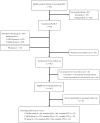IQ Was Not Improved by Post-Discharge Fortification of Breastmilk in Very Preterm Infants
- PMID: 35807888
- PMCID: PMC9268839
- DOI: 10.3390/nu14132709
IQ Was Not Improved by Post-Discharge Fortification of Breastmilk in Very Preterm Infants
Abstract
(1) Very preterm infants are at increased risk of cognitive deficits, motor impairments, and behavioural problems. Studies have tied insufficient nutrition and growth to an increased risk of neurodevelopmental impairment; (2) Methods: Follow-up study on cognitive and neuropsychological development at 6 years corrected age (CA) in 214 very preterm infants, including 141 breastfed infants randomised to mother's own milk (MOM) with (F-MOM) or without (U-MOM) fortification and 73 infants fed a preterm formula (PF-group), from shortly before discharge to 4 months CA. Infants with serious congenital anomalies or major neonatal morbidities were excluded prior to intervention. The Wechsler Intelligence Scale for Children IV was used for cognitive testing, and the children's parents completed the Five to Fifteen Questionnaire (FTF); (3) Results: Post-discharge fortification of MOM did not improve either full-scale intelligence quotient (FSIQ) with a median of 104 vs. 105.5 (p = 0.29), subdomain scores, or any domain score on the FTF questionnaire. Compared to the PF group, the MOM group had significantly better verbal comprehension score with a median of 110 vs. 106 (p = 0.03) and significantly better motor skills scores on the FTF questionnaire (p = 0.01); (4) Conclusions: The study supports breastfeeding without fortification as post-discharge nutrition in very preterm infants, and it seems superior to preterm formula.
Keywords: Five to Fifteen Questionnaire; Wechsler Intelligence Scale for Children IV; breastfeeding; cognitive development; fortification; post-discharge nutrition; preterm infant.
Conflict of interest statement
The authors declare no conflict of interest. The funders had no role in the design of the study; in the collection, analyses, or interpretation of data; in the writing of the manuscript, or in the decision to publish the results.
Similar articles
-
Nutrition, growth, and allergic diseases among very preterm infants after hospital discharge.Dan Med J. 2013 Feb;60(2):B4588. Dan Med J. 2013. PMID: 23461996 Review.
-
Association between Early Feeding Patterns and Neonatal Outcomes in Very Preterm Infants: A Retrospective Cohort Study.Neonatology. 2023;120(1):71-80. doi: 10.1159/000527522. Epub 2023 Jan 5. Neonatology. 2023. PMID: 36603553
-
Longitudinal Follow-up of Preterm Breastfeeding to 12 Weeks Corrected Gestational Age.Adv Neonatal Care. 2022 Dec 1;22(6):571-577. doi: 10.1097/ANC.0000000000000925. Epub 2021 Nov 2. Adv Neonatal Care. 2022. PMID: 34743110
-
Effects of Donor Breastmilk Feeding on Growth and Early Neurodevelopmental Outcomes in Preterm Infants: An Observational Study.Clin Ther. 2017 Jun;39(6):1210-1220. doi: 10.1016/j.clinthera.2017.05.341. Epub 2017 May 30. Clin Ther. 2017. PMID: 28576299
-
Postdischarge Nutrition of Preterm Infants: Breastfeeding, Complementary Foods, Eating Behavior and Feeding Problems.Nestle Nutr Inst Workshop Ser. 2021;96:34-44. doi: 10.1159/000519399. Epub 2022 May 10. Nestle Nutr Inst Workshop Ser. 2021. PMID: 35537432 Review.
Cited by
-
[Research hotspots in post-discharge follow-up management of preterm infants].Zhongguo Dang Dai Er Ke Za Zhi. 2023 Jun 15;25(6):560-565. doi: 10.7499/j.issn.1008-8830.2212052. Zhongguo Dang Dai Er Ke Za Zhi. 2023. PMID: 37382123 Free PMC article. Review. Chinese.
-
Early Nutrition Must Be Safe and Should Have Positive Impacts on Long-Term Health.Nutrients. 2023 Jun 6;15(12):2645. doi: 10.3390/nu15122645. Nutrients. 2023. PMID: 37375549 Free PMC article.
-
Strategies for the Fortification of Human Milk in Preterm Infants: A Systematic Review.Cureus. 2024 Nov 10;16(11):e73380. doi: 10.7759/cureus.73380. eCollection 2024 Nov. Cureus. 2024. PMID: 39659332 Free PMC article. Review.
References
-
- Twilhaar E.S., Wade R.M., de Kieviet J.F., van Goudoever J.B., van Elburg R.M., Oosterlaan J. Cognitive Outcomes of Children Born Extremely or Very Preterm Since the 1990s and Associated Risk Factors: A Meta-analysis and Meta-regression. JAMA Pediatr. 2018;172:361–367. doi: 10.1001/jamapediatrics.2017.5323. - DOI - PMC - PubMed
-
- Coviello C., Keunen K., Kersbergen K.J., Groenendaal F., Leemans A., Peels B., Isgum I., Viergever M.A., de Vries L.S., Buonocore G., et al. Effects of early nutrition and growth on brain volumes, white matter microstructure, and neurodevelopmental outcome in preterm newborns. Pediatr. Res. 2018;83:102–110. doi: 10.1038/pr.2017.227. - DOI - PubMed
-
- Arslanoglu S., Boquien C.Y., King C., Lamireau D., Tonetto P., Barnett D., Bertino E., Gaya A., Gebauer C., Grovslien A., et al. Fortification of Human Milk for Preterm Infants: Update and Recommendations of the European Milk Bank Association (EMBA) Working Group on Human Milk Fortification. Front. Pediatr. 2019;7:76. doi: 10.3389/fped.2019.00076. - DOI - PMC - PubMed
Publication types
MeSH terms
LinkOut - more resources
Full Text Sources
Medical


